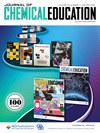Implementing an Environmental Contaminants Deliberation Module in General Chemistry
IF 2.9
3区 教育学
Q2 CHEMISTRY, MULTIDISCIPLINARY
引用次数: 0
Abstract
Placing chemistry in the context of complex societal issues is one way to help students see the application of fundamental ideas in the general chemistry curriculum. Here, we describe the impact of an in-class deliberation on environmental contaminants, which encourages students to consider different perspectives when addressing the issue of water and soil quality in communities. Student surveys were used to analyze the quality of the deliberation and several key factors regarding student attitudes before and after the activity. Students report a high-quality experience during the deliberation, wherein new ideas were introduced and they carefully considered different views on the issue at hand. Not only do students gain scientific knowledge about lead contamination, they also demonstrate statistically significant gains in their attitudes toward chemistry and their motivation to take action. As a complement to traditional teaching methods, this deliberation module can address key learning outcomes in systems thinking and the impact chemistry has on society.

在《普通化学》中实施环境污染物审议模块
将化学置于复杂的社会问题背景中,是帮助学生理解普通化学课程中基本思想的应用的一种方法。在此,我们描述了关于环境污染物的课内讨论的影响,该讨论鼓励学生在解决社区的水和土壤质量问题时考虑不同的观点。我们通过学生调查分析了讨论的质量以及活动前后学生态度的几个关键因素。学生们表示在讨论过程中获得了高质量的体验,引入了新的想法,并认真思考了关于当前问题的不同观点。学生们不仅获得了有关铅污染的科学知识,他们对化学的态度和采取行动的积极性也有了统计学意义上的显著提高。作为传统教学方法的补充,该审议模块可以解决系统思考和化学对社会影响方面的关键学习成果。
本文章由计算机程序翻译,如有差异,请以英文原文为准。
求助全文
约1分钟内获得全文
求助全文
来源期刊

Journal of Chemical Education
化学-化学综合
CiteScore
5.60
自引率
50.00%
发文量
465
审稿时长
6.5 months
期刊介绍:
The Journal of Chemical Education is the official journal of the Division of Chemical Education of the American Chemical Society, co-published with the American Chemical Society Publications Division. Launched in 1924, the Journal of Chemical Education is the world’s premier chemical education journal. The Journal publishes peer-reviewed articles and related information as a resource to those in the field of chemical education and to those institutions that serve them. JCE typically addresses chemical content, activities, laboratory experiments, instructional methods, and pedagogies. The Journal serves as a means of communication among people across the world who are interested in the teaching and learning of chemistry. This includes instructors of chemistry from middle school through graduate school, professional staff who support these teaching activities, as well as some scientists in commerce, industry, and government.
 求助内容:
求助内容: 应助结果提醒方式:
应助结果提醒方式:


